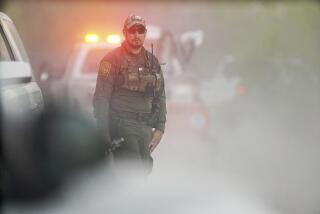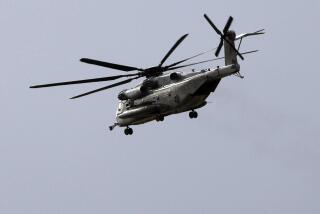Charles R. Bond Jr. dies at 94; retired Air Force general, former Flying Tiger
Charles R. Bond Jr., a retired Air Force major general and one of the last surviving Flying Tigers, died Aug. 18 from the effects of dementia at Presbyterian Village North, an assisted-living community in Dallas. He was 94.
In September 1941, he left the Army Air Forces to volunteer for service in China as part of a secret program, the American Volunteer Group, nicknamed the Flying Tigers, under Gen. Claire Chennault. Made up of about 400 pilots and ground personnel and based in Burma and China, the Flying Tigers protected military supply routes between China and Burma and helped get supplies to Chinese forces fighting the Japanese.
The group’s exploits became legend. Flying the P-40 aircraft, their fuselages painted with a toothsome tiger, the Flying Tigers were credited with shooting down 299 enemy planes and destroying 200 on the ground, even though the Japanese at times outnumbered Chennault’s group 15 planes to 1. On one day in late February 1942, the Flying Tigers downed 28 Japanese planes while losing none.
During one of the 1942 engagements, Bond destroyed three Japanese planes while piloting his P-40B. He was credited with nine kills in all.
Bond was shot down twice. On May 4, 1942, three Japanese fighters zeroed in on his plane over Paoshan, China, and his plane and clothing caught fire. Parachuting into a cemetery, he ran to a creek and was able to douse the flames. After spending a few weeks in a hospital, he returned to combat and was shot down again June 12, 1942. Despite head injuries -- and shrapnel that he carried in his head the rest of his life -- he was back in action a week later.
Charles Rankin Bond Jr., who was born in Dallas on April 22, 1915, had wanted to fly since he was 15. An honor student and Golden Gloves boxing champion in high school, he hoped to study engineering, but his working-class family could not afford college during the Depression. A daughter, Cindy Gilmer, said that one of the reasons he eventually joined the Flying Tigers was the promise of $500 for every Japanese plane he shot down.
He used the money he earned as an ace to help his parents buy a house.
He began his military career as an enlistee in the Texas National Guard. He later served in the Army, hoping for an appointment to the U.S. Military Academy at West Point.
Instead, he entered the Aviation Cadet Program in 1938 and was commissioned a year later at Randolph Field, Texas.
After his combat exploits in the Far East, he returned to Dallas. He tried civilian life, working as a commercial pilot, but found it boring. After three weeks he rejoined the Army Air Forces.
He was assigned to the Army Air Force School of Applied Tactics in Orlando, Fla. A year later, he became chief of the Air Division of the U.S. Military Mission in Moscow, where he served as aide to Ambassador W. Averill Harriman.
In 1949, he received an undergraduate degree in management engineering from Texas A&M University.
He held a number of command positions during his long career, including simultaneous service during the Vietnam War as deputy commanding officer of the 2nd Air Division, headquartered in Vietnam, and of the 13th Air Force, headquartered in the Philippines.
From 1967 until his retirement in 1969, he was commander of the 12th Air Force in Waco, Texas.
He later worked as a military consultant for Texas Instruments and as a skylight manufacturing representative before retiring again in 1983. He co-wrote “A Flying Tiger’s Diary” (1984) with Terry Anderson.
Bond’s wife, Doris Walker Bond, died in 1983. Survivors, in addition to his daughter, of Richardson, Texas, include three children, Becky Stuart of Pensacola, Fla., Mary Jean Bond of Mesquite, Texas, and Chuck Bond of Tulsa, Okla.; a brother; and four grandchildren.
Although their exploits were legendary, the Flying Tigers were not officially recognized for decades after World War II, because they were not an official wing of the military.
Finally, in 1996, a day after the 55th anniversary of the Japanese bombing of Pearl Harbor, Air Force Chief of Staff Ronald R. Fogleman presented 255 Distinguished Flying Crosses and Bronze Stars to surviving members of the Flying Tigers or their families.
Bond told reporters that the Distinguished Flying Cross he received that day was one of the greatest honors of his life. He already had been awarded the Legion of Merit and the Purple Heart.
“The good Lord had to be on our side,” he said, recalling his wartime experiences.
Holley writes for the Washington Post.
More to Read
Start your day right
Sign up for Essential California for the L.A. Times biggest news, features and recommendations in your inbox six days a week.
You may occasionally receive promotional content from the Los Angeles Times.






